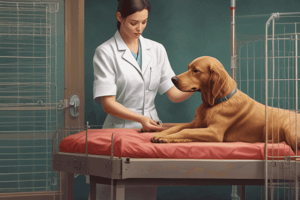Podcast
Questions and Answers
What is the #1 potential complication when restraining gerbils? (Select one)
What is the #1 potential complication when restraining gerbils? (Select one)
- Overheating
- Tail slip (correct)
- Fur slip
- Nail slip
Which of the following restraint techniques is best for collecting blood from the cranial vena cava of a ferret? (Select one)
Which of the following restraint techniques is best for collecting blood from the cranial vena cava of a ferret? (Select one)
- Scruffing
- Burrito towel wrap
- Sedation (correct)
How does one place a rabbit back into its cage or carrier to minimize the risk of injury? (Select one)
How does one place a rabbit back into its cage or carrier to minimize the risk of injury? (Select one)
- Backward with eyes covered (correct)
- Sideways like a football
- Sideways with eyes covered
- Forward with eyes covered
Try NOT to handle a hamster when it is... (Select one)
Try NOT to handle a hamster when it is... (Select one)
What is a potential complication to performing a full hand scruff in the hamster? (Select one)
What is a potential complication to performing a full hand scruff in the hamster? (Select one)
Rabbits have very strong forearms.
Rabbits have very strong forearms.
The rabbit belongs to the family called: (Select one)
The rabbit belongs to the family called: (Select one)
The large ears of the rabbit are: (Select one)
The large ears of the rabbit are: (Select one)
NEVER pick up a rabbit by the ears.
NEVER pick up a rabbit by the ears.
Because rabbits are most active at dusk and dawn, they are: (Select one)
Because rabbits are most active at dusk and dawn, they are: (Select one)
Rabbits have a blind spot located: (Select one)
Rabbits have a blind spot located: (Select one)
The rabbit is called an obligate breather. This means the rabbit breathes through its: (Select one)
The rabbit is called an obligate breather. This means the rabbit breathes through its: (Select one)
Open-mouth breathing in the rabbit is always abnormal.
Open-mouth breathing in the rabbit is always abnormal.
In the rabbit, the incisors behind the first pair of incisors are called the: (Select one)
In the rabbit, the incisors behind the first pair of incisors are called the: (Select one)
The large fatty fold located under a doe's (female) lower jaw is called a ____ lap.
The large fatty fold located under a doe's (female) lower jaw is called a ____ lap.
Rabbit chest cavity is very small.
Rabbit chest cavity is very small.
Because of the unique anatomical make-up of the rabbit GI system, the rabbit cannot: (Select one)
Because of the unique anatomical make-up of the rabbit GI system, the rabbit cannot: (Select one)
Fiber is important in a rabbit's diet. ____ is the part of the digestive system where bacterial fermentation occurs. (Select one)
Fiber is important in a rabbit's diet. ____ is the part of the digestive system where bacterial fermentation occurs. (Select one)
These are nutrient-rich fecal pellets that rabbits consume right after defecating. What are these pellets called? (Select one)
These are nutrient-rich fecal pellets that rabbits consume right after defecating. What are these pellets called? (Select one)
What mineral is mainly secreted in rabbit urine at 45-60% more than the average mammal urine (2%)? (Select one)
What mineral is mainly secreted in rabbit urine at 45-60% more than the average mammal urine (2%)? (Select one)
As compared to other mammals, rabbits have no ____ on the bottom of their feet. (Select one)
As compared to other mammals, rabbits have no ____ on the bottom of their feet. (Select one)
Dyspnea in ball pythons can be due to what unique condition? (Select one)
Dyspnea in ball pythons can be due to what unique condition? (Select one)
Which of the following can expand in the reptile's GI and cause rupture? (Select one)
Which of the following can expand in the reptile's GI and cause rupture? (Select one)
Which fact is true regarding reptile reproductive disease? (Select one)
Which fact is true regarding reptile reproductive disease? (Select one)
Which of the following is acutely toxic in tortoises? (Select one)
Which of the following is acutely toxic in tortoises? (Select one)
A client is rushing in with a chameleon that had its tongue ripped off. Which of the following statements are true? (Select one)
A client is rushing in with a chameleon that had its tongue ripped off. Which of the following statements are true? (Select one)
Flashcards are hidden until you start studying
Study Notes
Gerbils and Hamsters
- Tail slip is the #1 potential complication in restraining gerbils, highlighting the importance of proper handling techniques.
- Hamsters can sustain pre-existing risks during handling; their eyes may protrude if full scruff is applied.
Ferrets and Blood Collection
- Sedation is the most effective restraint technique for blood collection from the cranial vena cava in ferrets, ensuring minimal distress.
Rabbits and Handling
- Rabbits should be placed backward into carriers with their eyes covered to reduce the risk of injury during handling.
- It is crucial to avoid handling a sleeping hamster to prevent stress or injury.
Rabbit Anatomy and Physiology
- Rabbits belong to the Lagomorphs family; they share this classification with hares and pikas.
- Their large ears are thermosensitive, highly vascular, and fragile, making them sensitive to injury.
- Rabbits are obligate nasal breathers, with any open-mouth breathing considered abnormal.
- They possess blind spots located in front of their nose but rely heavily on whiskers and lips for navigation.
Dietary Needs and Digestion in Rabbits
- Fiber is essential for a rabbit's diet; the large cecum is the primary site for bacterial fermentation, akin to horses.
- Cecotropes, nutrient-rich fecal pellets, are consumed immediately after defecation, ensuring nutrient absorption.
Unique Rabbit Characteristics
- Rabbit urine contains higher levels of calcium (45-60% more than average mammals), necessitating monitoring.
- Unlike other mammals, rabbits do not have footpads, influencing their movement and handling.
Reptile Health and Diseases
- Dyspnea in ball pythons can result from chondromas of the trachea, underscoring the need for careful assessment of respiratory issues.
- Cricket water gel can expand in a reptile's gastrointestinal tract, posing a risk of rupture.
- Reptile reproductive diseases may present with calcified eggs and anorexia, indicating urgent veterinary intervention may be required.
Toxic Plants and Injuries in Reptiles
- Red Oak is acutely toxic to tortoises, necessitating awareness of plant toxicity in reptile care.
- Chameleons with tongue injuries will likely adapt to capturing prey using their mouths, emphasizing their resilience.
Studying That Suits You
Use AI to generate personalized quizzes and flashcards to suit your learning preferences.




